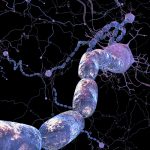My father, Ian Collins, was diagnosed with multiple sclerosis (MS) in the 1960s, more than a decade before I was born and at a time when much less was known about the condition in Australia. But as a young child, I sensed that something was slightly ‘different’ about him; his balance was patchy, and he would regularly seem surprised by sudden movements from outside his peripheral vision.
As I grew older, I noticed my parents making all kinds of efforts, based on the evidence available at the time, in defence against his condition. Dad would take Evening Primrose Oil capsules religiously every morning, sit in the morning sun to ensure adequate vitamin D exposure, and squeeze rubber balls in his palms twice-daily in an effort to ‘strengthen his hands’. All valiant efforts, but sadly unsuccessful in staving off the progression of his disease which was, unfortunately, on the severe end of the spectrum.
My father died in a high-needs residential care facility in 2009, more than forty years after his diagnosis. As a family, we made the decision to donate his tissue to the MS Research Australia Brain Bank at the University of Sydney in an effort to assist scientific endeavours to find a cause and cure for MS. At the time, my father’s brain was one of the oldest MS brains donated to medical science – he certainly put in a courageous fight over four decades.
In the years since my father’s death, thanks to the dedication of medical researchers around the globe, we now know a lot more about MS. The inroads into management options alone are astonishing and hopeful – a cause for celebration for both patients and families. Thankfully, an MS diagnosis in 2019 doesn’t necessarily lead to the prolonged struggle that my father and family experienced. In the last ten years alone we have gone from having three disease modifying therapies available for the relapsing form of MS, to twelve, and there are now treatments available for some people with progressive disease.
In honour of my father’s memory, and to help the collective effort to prevent, treat and cure MS, I’ve been pleased to be able to support MS Research Australia over the past ten years. I’ve done this primarily through endurance running, completing several half-marathons and a marathon, and raising vital funds for medical research along the way. This seems befitting given my father was a great athlete in his youth – a State-level cricketer, a rugby player and an all-round sportsman – and certainly endured over the course of his life.
It’s my hope that in the not-too-distant future, with the ongoing support of donors, medical researchers will achieve the vital breakthroughs needed so that no one will have to endure MS, ever again.
To find out more about raising funds for MS research like Fiona, visit the Kiss Goodbye to MS website.
The MS Research Australia Brain Bank provides tissue from the brain and spinal cord which is characterised under the microscope for use in research into MS. This resource allows researchers to answer questions about changes to the brain in MS that cannot be answered in any other way. If you are interested in becoming a donor please visit the MS Research Australia Brain Bank website or call 1300 672 265.






